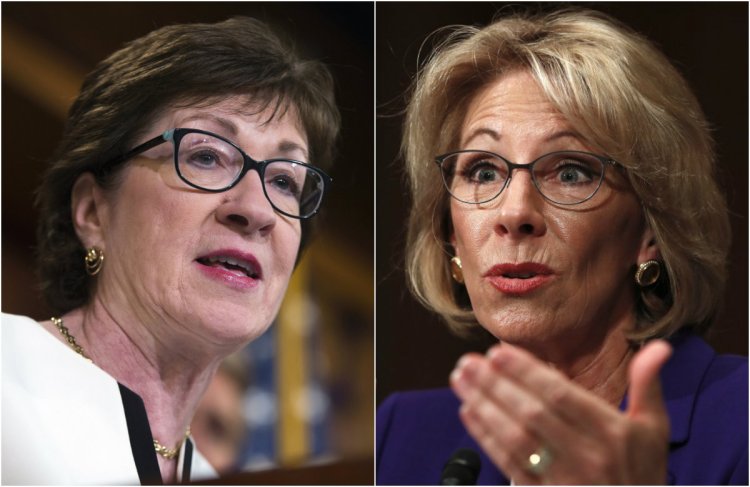Maine Sen. Susan Collins said Wednesday she would not support Betsy DeVos’ bid for education secretary, a day after Collins’ committee-level vote in support of DeVos helped send the nomination to the Senate floor for approval.
Collins is one of a small number of Republican senators who have openly criticized some of President Trump’s actions and nominees. On Tuesday, she said she had concerns about DeVos becoming education secretary and might oppose the nomination even though she supported her at the committee level.
On Wednesday, Collins outlined her reservations during a speech on the Senate floor.
“DeVos’ lack of experience with public schools will make it difficult for her to understand, identify and assist with those challenges, particularly for our rural schools in states like Maine,” she said.
DeVos, a billionaire Michigan philanthropist, is a champion of charter schools who favors using taxpayer dollars to pay for private and parochial school tuition via vouchers. Maine’s other senator, independent Angus King, already has announced he will vote against DeVos because of her lack of commitment to public education.
“Her whole career has been school choice to the exclusion of the basic public education system, and I am just such a firm believer in public education that I can’t go that far,” King said in January.
During her speech Wednesday, Collins pointed out DeVos’ charter school connections.
“She appears to view education through the lens of her experience of promoting alternatives to public education in Detroit and other cities where she has, no doubt, done valuable work,” Collins said.
Collins said her decision was a “very difficult one” to make, but that ultimately she believes DeVos lacks the qualifications to be the country’s top education official.
“This is not a decision that I have made lightly,” Collins said. “I have a great deal of respect for Mrs. DeVos. I believe that she is a good person. I know she cares deeply about the children of this nation.”
Shortly after Collins announced her intention to oppose DeVos, another Republican senator, Lisa Murkowski of Alaska, also said she would oppose DeVos’ nomination.
Republicans have a 52-48 edge in the Senate, meaning three Republicans and all the Democrats would have to vote against DeVos for her to be denied confirmation. If there is a 50-50 vote in the Senate, Vice President Mike Pence would cast the tie-breaking vote.
Collins has been criticized by some of her opponents for similar votes in the past, but took pains Wednesday to explain her position on allowing the full Senate to take a vote on DeVos.
“I believe that presidents are entitled to considerable deference in the selection of Cabinet members regardless of which political party is in power, and that each and every senator should have the right to cast his or her vote on nominees for the Cabinet.”
Collins said her vote to proceed is similar to ones she made on Cabinet nominees of former President Obama. She eventually voted against confirming some of those nominees, Collins said.
Among her concerns with DeVos is her lack of understanding of federal law that requires the government to provide all children, including those with special needs, access to a public education.
Collins said she recognized DeVos had worked to improve the education of at-risk children in some of the nation’s inner cities. She also said she wrote to DeVos asking her to promise she would not support any federal law to move federal public education funding to a voucher system or use the threat of withholding federal funds to force states to adopt voucher systems for public education.
Collins said DeVos assured her, in writing, that she would not. But Collins said DeVos’ focus on vouchers and charter schools suggests she lacks an appreciation that the secretary of education’s “primary focus must be on helping states and communities – parents, teachers, school board members and administrators – strengthen our public schools.”
Murkowski said Alaskans had doubts about DeVos’ nomination despite her promise to uphold federal education law and not force states to move toward voucher programs. She said the previous focus that DeVos placed on charter schools and vouchers made it hard for her to believe DeVos could be fully objective when it came to public schools.
“Their concerns center, as mine do, on Mrs. DeVos’ lack of experience with public education and the lack of knowledge that she portrayed in her confirmation hearing,” Murkowski said. “Alaskans are not satisfied that she would uphold federal civil rights laws in schools that receive federal funds. They question her commitment to students with disability rights. They fear that the voucher programs that are intended to serve them may actually rob them of an opportunity to benefit in an inclusive environment with their non-disabled peers.”
Lois Kilby-Chesley, president of the Maine Education Association, the union that represents 23,500 public school teachers in Maine, said the union was “grateful” for Collins’ statements Wednesday. The MEA had opposed DeVos’ nomination.
“It is refreshing to see a lawmaker who is willing to listen to educators, the experts in the classroom, when it comes to key decisions concerning our students and the profession,” Kilby-Chesley said in a written statement. “MEA members can only be hopeful that more Republican leaders will follow in the footsteps of U.S. Sen. Susan Collins.”
The Senate did not vote on DeVos’ final confirmation Wednesday, when members were starting to make their speeches on why they would support or oppose it.
Scott Thistle can be contacted at 791-6330 or at:
sthistle@pressherald.com
Twitter: thisdog
Send questions/comments to the editors.




